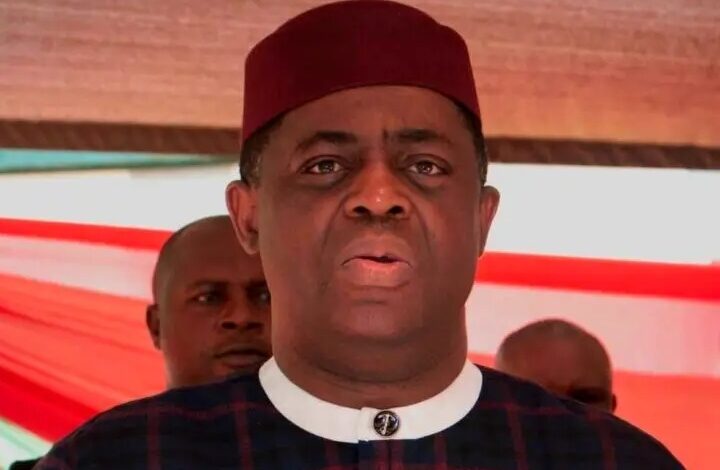Femi Fani-Kayode: The Spy Who Fooled Us By Citizen Bolaji O. Akinyemi

FFK and the Talk Merchants: The Spy, the Silence, and the Slaughter
There is a generation of public voices in Nigeria who talk for bread, not for truth. They are the talk merchants of our tragedy — loud when the powerful need justification, mute when the powerless need justice. None embodies this betrayal more consistently than Femi Fani-Kayode (FFK) — a man who has perfected the art of prostituting his intellect for recognition, relevance, and reward.
The Spy Who Fooled Us
Femi Fani-Kayode is not a Christian; neither is he a Muslim. He is a mole for every and anything that guarantees him attention and access. His convictions are negotiable; his faith, a matter of convenience. Once upon a time, he was the advocate of Northern Christians — voicing their pain in the day and taking instructions from their oppressors at night. Then came his open turbaning as a Northern chief, confirming his genealogical loyalty to his Fulani heritage.
But this is not about ancestry; it is about duplicity. The Fulani, like every other Nigerian people, deserve dignity, education, and citizenship — not suspicion or scorn. What they need is liberation from the prison of feudalism, not applause for conquest. The tragedy lies not in the Fulani’s pursuit of power but in the state’s refusal to educate and integrate them as citizens of equal standing under a just constitution.
That failure — constitutional, not ethnic — is what sustains the cycle of blood and backwardness. The forest Fulani phenomenon is not a tribal curse; it is a systemic creation. An uneducated population raised on the theology of conquest will continue to believe that domination is destiny until a restructured Nigeria dismantles the economic and political incentives of feudal violence.
The author, Bolaji O. Akinyemi
The Merchants of Noise
Today, Nigeria’s public space is dominated by men who speak without soul — FFK, Sowunmi, Reno Omokri, Olayinka, Daniel Bwala, and their like. They are talk merchants, not truth bearers. They occupy television studios like traders in the market of manipulation — selling soundbites to buyers in power.
Their moral currency is not conscience but convenience. They claim to interpret the pulse of the nation but are merely echoing the heartbeat of their paymasters. Between them and the government’s official megaphones, Chief Bayo Onanuga now stands taller in communication credibility — a shocking testimony of how the opposition’s conscience has collapsed.
While the poor are slaughtered in Plateau and Benue, these talk merchants debate political gossip. While farmers flee ancestral lands, they trend hashtags. While widows wait for justice, they wait for appointments. Their noise fills the air; their silence fills the morgues.
The Silence that Kills
The tragedy of Nigeria today is not only that people are dying; it is that those who should speak have become partners in silence. From the Church’s hierarchy to the nation’s high offices, there is a conspiracy of comfort.
The Christian Association of Nigeria (CAN), now a political bureau rather than a prophetic body, recently claimed that the killings have “no pattern.” That statement alone should qualify as blasphemy. When blood flows in Benue and the Church calls it “patternless,” we have not just lost our faith — we have lost our moral compass.
Femi Fani-Kayode and his ilk seize upon such confusion to project themselves as “defenders of truth.” But FFK is not defending Christianity; he is defending attention. His positions shift with the tides of opportunity. He was once a friend of Nnamdi Kanu (NMK), shouting “Biafra now!” until the microphone moved elsewhere. He was once a senior brother to Sunday Igboho, trusted with secrets that only betrayal could reveal. The day the DSS raided Igboho’s home, one must wonder: whose footprints led the hunters to the door?
The Spy and the System
Fani-Kayode’s story is not an isolated tragedy; it is the parable of Nigeria’s political decay. The system rewards opportunism, not integrity. In a country where betrayal is a career path, FFK simply perfected the syllabus.
He is a child of the establishment, an heir of privilege who discovered early that truth doesn’t pay, but treachery does. When opposition dries up, he crosses over. When loyalty loses value, he auctions it to the highest bidder. In every administration, he finds a stool by the window of power — and when chased away, he returns with a hymnbook of apology and a new audience of admirers.
Yet, this is not merely about one man’s moral bankruptcy. It is about a nation without consequence. The likes of FFK thrive because the Nigerian system protects betrayal and punishes conviction. In a land where the corrupt write the rules and the courageous are written off, deception becomes survival.
The Slaughter and the Structure
The bloodshed across Nigeria is not random; it is structural. It is the inevitable outcome of a broken federation sustained by a fraudulent constitution. The 1999 Constitution, as amended, is not a social contract — it is a colonial relic dressed in civilian robes. It protects the powerful, not the people.
Until Nigeria returns to the 1963 Constitution — the last one negotiated in good faith by our founding regions — no election or rhetoric will redeem the Republic. Without true federalism, every ethnic group will remain a prisoner of another’s ambition.
That is why 2027, under the present system, holds no promise. Whatever emerges from it will be the best of a terribly bad situation. Until we reform the structure, the blood will keep flowing — and talk merchants will keep debating the colour of the river.
Beneath the Surface: The Spirit Behind the Struggle
Beneath the surface of our confrontation lies a deeper conflict — the spirituality of ethnic components driving for superiority. The cry of genocide in Nigeria is not merely about religion; it is the revelation of our low level of civilisation. We mourn not just for what it is, but for what it is not — a problem not truly and totally understood can never find a solution.
There are indeed Islamic extremist complications threatening global peace. Yet, our national peril is not fanned primarily by global jihadists; it is local in origin — rooted in the Risala of 1903, an ideological extract from the Hadith of Usman Danfodio, not from the Qur’an itself.
Any honest Muslim scholar will admit that Usman Danfodio was not a prophet but a Fulani warlord, leading his tribe in search of conquest and homeland across the African continent. Nigeria, the richest soil in Africa, became the ultimate prize. The forest Fulani has been indoctrinated to believe that Danfodio’s “victory” over Hausa lands was a divine inheritance — that Nigeria itself is the spoils of jihad granted to his offspring.
This is the theology behind the machetes and the AK-47s — not the Qur’an, but the Risala mentality of 1804: a political creed disguised as divine destiny.
In Europe and America, children belong to the state; they are protected from the ideological abuses of parents when such ideologies contradict public policy or civic values. In Nigeria, the opposite holds true — we raise children within the walls of hate and call it heritage.
Episodes of violence across Nigeria
I have given up on the current generation of Fulani politicians and clerics who have embraced hate as theology and domination as destiny. My hope is for the Fulani child — and for every Nigerian child — to be rescued from this generational curse that weaponises ignorance and glorifies violence.
The Almajiri reform initiated by Dr. Goodluck Ebele Jonathan was one of the most visionary attempts to break this cycle — an effort to dignify the existence of children born into street servitude. It remains one of Nigeria’s most productive long-term interventions against the roots of terror.
This is where the government must rediscover the courage of the late sage Chief Obafemi Awolowo, who made education compulsory and criminalised parental neglect. Any nation that fails to educate its children will one day fight them in forests and cities alike.
The ongoing episodes of violence across Nigeria are not random acts of banditry. They are rituals of renewal — desperate attempts to revalidate the supposed spiritual power of 1804, which some Fulani warlords believe was to expire after two centuries.
But history has run ahead of that myth. It has been 221 years since 1804. The emergence of the Oodua People’s Congress (OPC) to dismantle Fulani domination in Ilorin, and of Jaruma Hausa movements to reclaim Hausaland from Fulani hegemony, are not coincidences. They are spiritual and sociopolitical reactions to an expired conquest ideology.
It was this same fear — of losing that ancient grip — that birthed the political recruitment of Muhammadu Buhari into national politics, engineered by men like Engr. Buba Galadima, to preserve what they called the Fulani mandate of Usman Danfodio.
Whatever solution fails to attack the root of our national crisis merely engrafts the branches, expecting new fruits from a rotten tree. Until we confront the ideological foundation of our dysfunction — the fusion of feudal theology with federal authority — Nigeria will keep bleeding from self-inflicted wounds.
The post Femi Fani-Kayode: The Spy Who Fooled Us
By Citizen Bolaji O. Akinyemi
first appeared on Diaspora Digital Media DDM.





